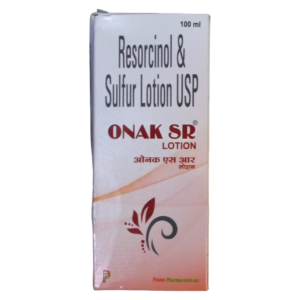RESORCINOL + SULFUR
Resorcinol: Resorcinol is a topical medication commonly used in dermatology and other medical fields. It is a phenolic compound that is used to treat various skin conditions, including acne, eczema, psoriasis, and corns or calluses. Resorcinol works by reducing the production of skin cells and promoting their shedding, which helps to unclog pores and alleviate skin inflammation.
When used as an acne treatment, resorcinol is often combined with other medications like sulfur or salicylic acid to enhance its effects. It is available both over-the-counter and by prescription, depending on the concentration and formulation.
The usual dose of resorcinol depends on the specific product being used. In general, it is applied topically to the affected area once or twice daily. It is important to follow the instructions provided by the healthcare professional or provided on the product label.
As with any drug, resorcinol may cause side effects. Common side effects include skin irritation, redness, and dryness. These side effects are typically mild and resolve as the skin adjusts to the medication. However, if severe irritation, allergic reaction, or other unusual side effects occur, it is advisable to discontinue use and consult a healthcare professional.
Resorcinol should not be used on open wounds, broken or irritated skin, or in individuals with a known allergy or sensitivity to resorcinol or any of its components. It is important to consult a healthcare professional before using resorcinol, especially if there is a history of skin conditions, allergies, or sensitive skin.
In summary, resorcinol is a topical medication used to treat various skin conditions. It works by reducing skin cell production, unclogging pores, and alleviating inflammation. It is generally well-tolerated, although mild skin irritation is possible. It is important to use resorcinol as directed and consult a healthcare professional if any concerns arise.
Sulfur: Sulfur is a mineral that is used in the treatment of various skin conditions. It is commonly used as an ingredient in topical medications, such as creams, ointments, and lotions, for the treatment of acne, rosacea, seborrheic dermatitis, and scabies.
The exact mechanism of action of sulfur in treating these conditions is not fully understood. However, sulfur is known to have anti-inflammatory, antibacterial, and keratolytic properties. It helps to reduce inflammation, kill bacteria present on the skin, and promote the shedding of dead skin cells, thus unclogging pores and preventing the formation of acne lesions.
The dose of sulfur can vary depending on the formulation of the medication being used and the specific condition being treated. It is typically applied to the affected area once or twice a day, as directed by a healthcare professional. It is important to carefully follow the instructions provided with the medication or as prescribed by the doctor.
Common side effects of sulfur use include skin dryness, irritation, and temporary discoloration of the skin. Some individuals may also experience a mild burning or stinging sensation upon application. These side effects are usually temporary and mild. However, if any severe or persistent side effects occur, it is important to seek medical attention.
It is worth noting that sulfur preparations can have a distinctive odor, which some individuals may find unpleasant. If you have any allergies or sensitivities to sulfur or any other medications, it is important to inform your healthcare provider before starting treatment with sulfur-containing products.
Overall, sulfur is a commonly used treatment for various skin conditions, and it can be effective in reducing symptoms and improving the appearance of the skin. However, as with any medication, it is important to use sulfur under the guidance of a healthcare professional and to monitor for any potential side effects.

